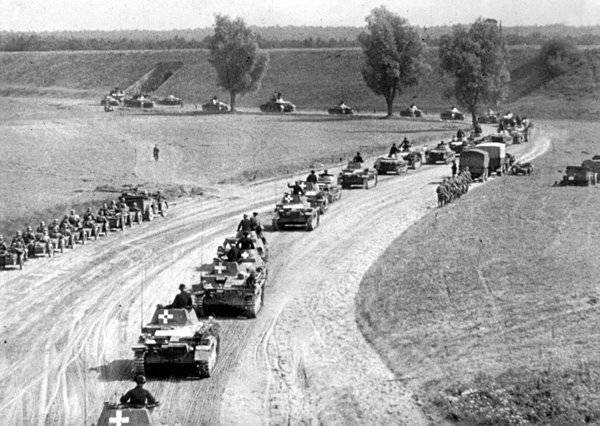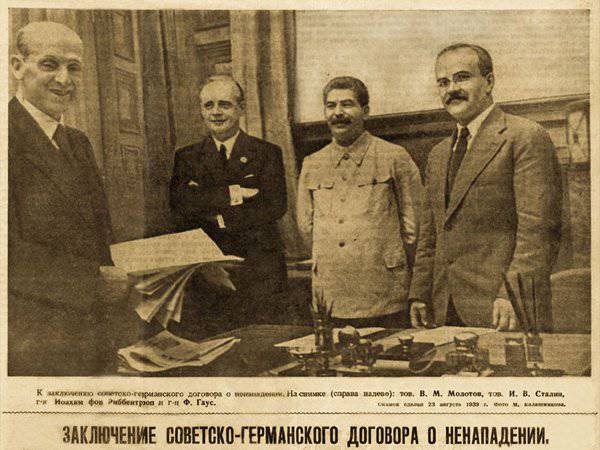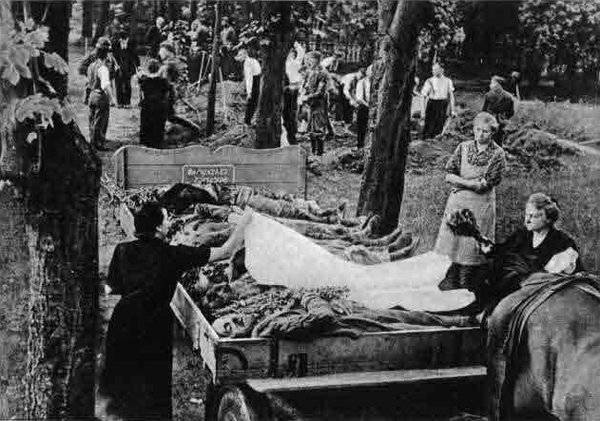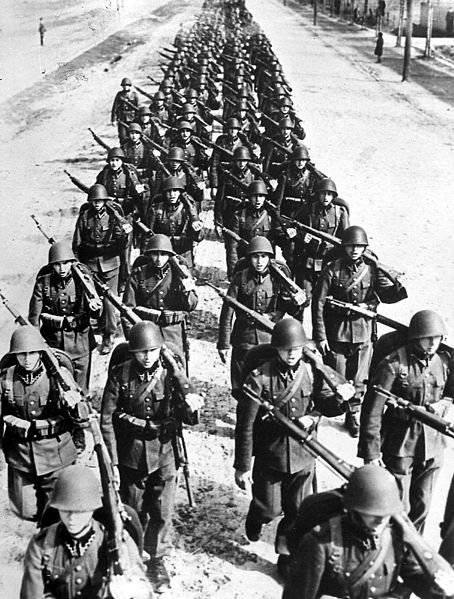"Pansky wrong side of World War II"
All these little-known facts that Niels Johansen from the Culture newspaper collected and analyzed. They do not write about it and practically do not speak, otherwise the whole “logic” of explanations of the Second World War will be violated.
Let's say at once - Hitler’s fault in the deaths of tens of millions of people is indisputable, and he is the unconditional and main enemy of the Russian people for all history Russia. But without understanding the hidden springs of the outbreak of World War II, we risk not understanding who and how today is trying to start a new global military conflict.

September 1 1939 of the year Germany is attacking Poland. Which has long and stubbornly provoked the Germans, seeking to start the war. The Polish leadership did not act in the interests of Poland. And in whose? In the interests of those who brought Hitler to power: London, Washington and Paris.
Recall: August 1939, in Moscow, negotiations of the Anglo-French delegation with the delegation of the USSR. It is impossible to negotiate an alliance that will stop Germany, solely through the fault of the West. And then, in a couple of days, Stalin signs the Nonaggression Pact with Germany - 23 August 1939.
By the time Hitler struck Poland (September 1) - the whole relationship between Moscow and Berlin is just a week! There is no friendship, there is no union, but there is an agreement “not to attack,” which is a week.
What are the reasons to believe that Adolf Hitler will perform it?
The West hoped that by defeating Poland, Hitler would strike the USSR on the move, or the conflict between Russians and Germans would begin on Polish territory. That will allow the Fuhrer to be returned to the framework of the scenario, for the sake of which he was brought to power: a war with the USSR. (And do not forget that at this moment the USSR is really already fighting! With Japan on Khalkhin Gol.)
It was the pushing of the West that led to the inadequate actions of Warsaw, which in every way provoked Hitler and sincerely believed that he would be defeated quickly and easily. Why? Because in the back of Germany will hit England and France.
But they betrayed Poland in September 1939, because they didn’t need to defeat Hitler, but his war with the USSR. For what Hitler's Germany had to be strong, and therefore the "strange war" began. When the French soldiers played football on the contact line with the Germans ...
Therefore, remembering the victims of the Second World War, let's not forget its true fathers, along with Hitler, who sacrificed many tens of millions of lives to solve their geopolitical tasks.
Source: http://portal-kultura.ru/articles/history/57924-panskaya-iznanka-vtoroy-mirovoy/
“75 years ago, 1 September 1939 of the year, struck the most terrible disaster in the history of mankind. Historians are still studying its prerequisites so far, but the events of the end of summer - the beginning of the autumn of 39 - seem to seem indisputable. The Third Reich attacked defenseless Poland, France and Great Britain declared war on the aggressor. But is it all clear?
... In Europe, a big war will soon begin, the USSR will try to draw into it. In Moscow, they were well aware of and acted on anticipation. At first, an attempt was made to link the Western powers with a pact. On the initiative of the Soviet side in the spring of 39, consultations began on concluding a collective security treaty with England and France. “With the official proposal to conclude a trilateral treaty, the Soviet Union made 2 June 1939 of the year, explains Dr. Yury Zhukov, Doctor of Historical Sciences. - But delegations from London and Paris arrived in Moscow only on August 11 - “we were delayed on the road”. Clement Voroshilov, people's commissar of defense, was present at the talks from the USSR, General Dumenc from France, and Admiral Drax from Great Britain. According to the Soviet proposals, joint military actions against Germany were to start if she attacked not only someone from this troika, but also a number of European states too. However, the negotiations failed: the European powers sent delegations to the Soviet Union that lacked authority. Drax and Dumenk, unlike Voroshilov, had no right to make decisions. ”
In other words, the British and French did not want to negotiate with the USSR. There is nothing surprising: it was these states with all their forces that contributed to the growth of the power of the Wehrmacht, six months before that they gave Hitler "armory Forge of Europe ”- Czech Republic. Earlier - Austria. To the Reich, gaining strength, rushed to the East, beat the Communists. But at the end of the summer of 1939, our diplomacy presented the West with an unpleasant surprise: on August 23, the so-called "Molotov-Ribbentrop Pact" was concluded - a non-aggression pact between Germany and the Soviet Union.
It turned out that Stalin and Molotov played on the internal problems of the Reich, which was an artificial, barely viable state. In the pre-war years, the defense industry spent there up to 57% of investments in fixed assets. At the same time, there were no own capital in the impoverished, ravaged by reparations of Germany, the MIC kept foreign “investors” with money. These gigantic funds went to the army, while problems were growing in the country, primarily food. “In Germany, a state of war was created, for which the economy, ideology and the life of society were subordinate to preparation,” recalls Vladimir Dobrenkov, Ph.D.

In the summer of 1939, Germany was on the verge of starvation. 20 September, just three weeks after the start of the Polish campaign, in the "victorious Reich" introduced the card system. It would be worse, but the Russians helped. Echelons with grain came from the USSR, the Germans paid for it with their high-tech - machine tools, optics, electronics, and weapons. For bread, our country was even given the latest heavy cruiser Lützow, which subsequently participated in the defense of Leningrad under the name "Petropavlovsk".
The Russians and the Germans needed to continue to be friends, beat the English and American plutocrats together - this thesis is very popular in the fiction of the alternative-historical genre. Dmitry Lavrinenko and Michael Wittman on the ruins of the Tower, Alexander Pokryshkin and Erich Hartmann flap their wings from above, and the sons of Denits and the children of Kuznetsov are drowning their enemies together at sea. Here only the authors miss one moment. Key. The USSR and the Third Reich were never friends.
To have time to prepare for the inevitable war — to rearm the army, complete the defense industry, relocate industry to the Urals. Such were the tasks of our country, only for the sake of this an agreement was concluded with Germany. A postponement was required, at any price. The price was not so high - just to feed your enemy.
And nothing more. There were no “secret protocols” to the agreement of 23 in August of 1939, they were invented later, during the restructuring. Another thing is that from trade - one step to closer interaction. According to the principle "the enemy of my enemy is my friend." But it was Poland at the end of the 30-s that represented the main real threat for the USSR, and, perhaps, for Hitler's Germany.
According to the official history, 31 August 1939, the German intelligence services organized the so-called “Gleivice incident” - a dramatization (as the official history interprets it) of the Polish attacks on the border German town. After this, the casus belli Wehrmacht rushed to the East. But you can take a different look.
First, the “Gleiwick incident” was not the first. From mid-summer 39, when the first consultations between Soviet and German diplomats began, regular units of the Polish army began to systematically invade Germany. According to the testimony of the Canadian historian Frank Kerneu near Königsberg - and not only - the cavalry of the lords burned German villages. People were pricked with pikes, chopped with sabers, castrated, hung up, raped, dragged on the lasso for horses. August 23 had to attract parts of the Wehrmacht to repel aggression.

Documentary evidence of the atrocities of zholner, especially in the town of Bromberg, including photographs, is. Moreover, no one ever tried to challenge them.
Only in the course of the “Bromberg pogrom” about five thousand civilians of German nationality perished, the total number going to tens of thousands. About this is written even in Wikipedia. For a long time, the Poles denied the facts of genocide and blamed the massacres of civilians on the mythical "Hitler saboteurs." But in 2003, the Polish historian Włodzimierz Jastrzhembsky nevertheless admitted that there were no saboteurs, and the Poles simply took out their anger on the peaceful German settlers.
Further more. 24 August Poland knocks out two Lufthansa civil aircraft, 30 August in Krakow, German consul August Schillinger was killed. No one doubts these facts either, it is simply not customary to recall them. “Poland is seeking a war with Germany, and Germany cannot avoid it, even if it wants,” said Polish Marshal Edward Rydz-Smigly to the British newspaper Daily Mail 6 August 1939. But this is, in fact, a declaration of war!
And from the words of the Poles quickly got down to business - they announced mobilization. “The latest report on the situation in Poland. Mobilization in Poland will be completed on 27 August. This suggests that we are lagging behind with mobilization. In order to complete the mobilization simultaneously with the Poles, we need to start its August 21. In this case, by the 27 of August, even the divisions of the third and fourth waves will be deployed. To consult with the commander in chief, ”Halder, Chief of the General Staff of the Land Forces of Germany, wrote in his 15 August 1939 diary.
But could Poland, in 39, attack Germany? “The Poles considered themselves to be a superpower. Plus they hoped for the help of their main ally, France. Together, they would undoubtedly beat the Germans, ”says historian Roy Medvedev.
The third republic possessed the most powerful army at that time in the world. For reference: Paris could exhibit 2,7 million bayonets, 3500 aircraft, about 4500 tanks (including up to 700 medium and over 300 heavy), 15 artillery barrels. Berlin - only 000 million people, up to 1,5 tanks (3000 of which were light Pz.I and Pz.II, there were no heavy ones at all, medium ones - about a hundred), up to 2800 airplanes and about 2000 cannons. “The French were able to literally roll out the Wehrmacht with its“ cardboard ”armored vehicles. There were more tanks, and not a single German gun penetrated the armor of the same B7000 bis. That is, both quantitatively and qualitatively, Paris defeated Berlin, ”says Maxim Kolomiets, historian of armored vehicles.

Since February 1939, the General Staff of the Commonwealth began developing a plan of operation with the straightforward name "West". In the summer of the same year, it began to be realized. By September 1, more than 25 infantry divisions were concentrated on the western border of the country, and around 20 were on the nearest approaches. Germany then had 75 – 80 divisions. In total - and the Poles, and the French, and the British, too.
By the way, in the 37 – 38 years, Poland was the main military ally of Germany, she took part in the division of Czechoslovakia, choking off the Cieszyn region (after the war she had to give it back). And the general staff of both armies developed a joint plan of attack on the USSR.
“Poland pursued a very aggressive policy, the story of the division of Czechoslovakia only proves it. And Warsaw more than once very obsessively offered itself as an ally to Berlin, called together to go to seize Russian territories. Notice, on their own initiative, "- said Roy Medvedev.
Information about the backwardness of the Polish army is not true. Thanks to England, France and the USA, there were enough weapons. The 7TP tank, also known as the Vickers Mk E (the same T-26), was in service, the development was 10TP (an analogue of the Soviet BT-7 - the favorite vehicle of Viktor Suvorov-Rezun, the notorious “freeway tank”), strong aviation (more than a thousand cars, up to 2000 - according to some sources), good artillery. In Soviet military doctrine, Poland was seen as a very serious enemy.
Yes, it is the enemy. “The dismemberment of Russia lies at the heart of Polish policy in the east ... Therefore, our possible position will be reduced to the following formula: who will take part in the section. Poland should not remain passive at this wonderful historical moment. The task is to prepare well in advance, ”is an excerpt from the report of the Polish General Staff from 1938. Comments, as they say, are superfluous.
Or here's an interesting fact. The Small Soviet Encyclopedia reported that in 1938, Poland spent a percentage of its state budget on 32’s army. That is, it was a "state of war."
And a little more about the Polish army. 40 – 45 divisions - this is not all. There are, for example, references to the 55 Infantry Division in the Krakow Army. Plus up to 30 cavalry corps: as part of each - two or three cavalry regiments, an armored personnel carrier regiment, several divisions of artillery, infantry in trucks (about 5000, a man of personnel). These are the very horse-mechanized groups for the creation of which Semyon Budyonny so advocated. Total we have more plus 15 divisions. In sum, already 70.
By the way. According to the memoirs of the head of the raw materials department of the German Ministry of Weapons Hans Kerl, the Wehrmacht captured at least one million Polish servicemen, while Soviet documents also mention 450 – 500 thousands of soldiers and officers captured by the Red Army. And a few tens of thousands simply fled home or fled to Romania or Hungary. We already see more than one and a half million, that is, a number equal to the Wehrmacht.
However, the above facts do not remove the guilt from Adolf Hitler and the Third Reich for unleashing a global slaughter. However, we should not forget that the beginning of the war was largely provoked by the famous pansy ambition and the desire of Warsaw to revive within the borders of the great medieval state - Rzecz Pospolita, and on the other hand - the criminal passivity and short-sightedness of Western leaders. ”
PS You can read more about the role of Poland in the material “Poland - an ally of Hitler»
Information